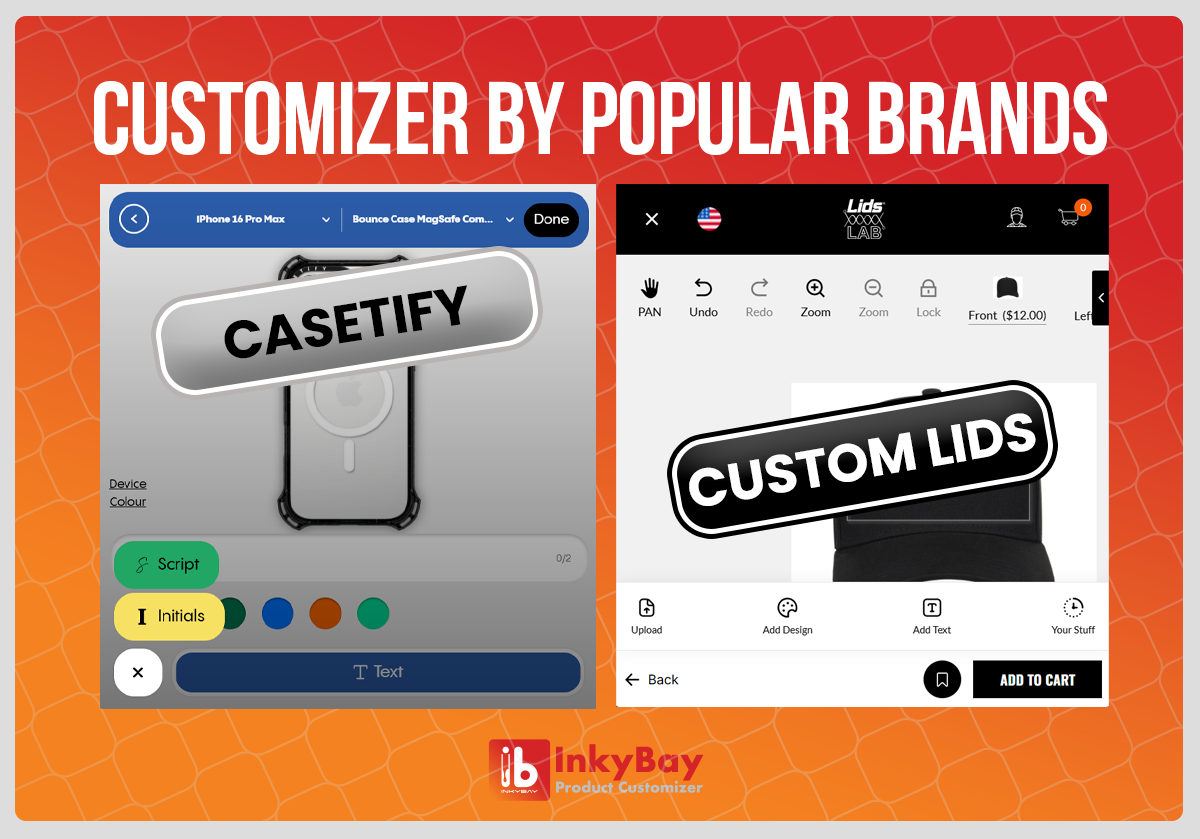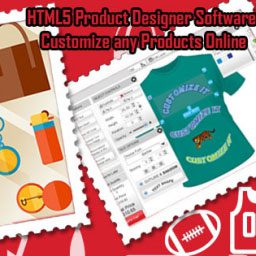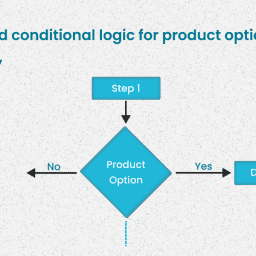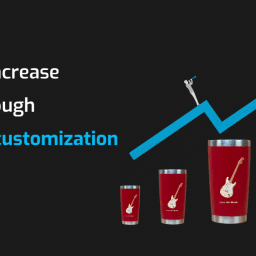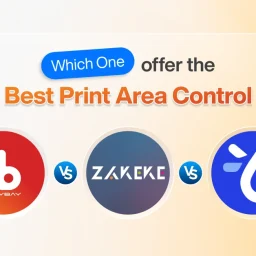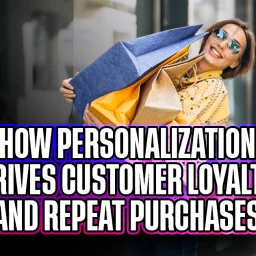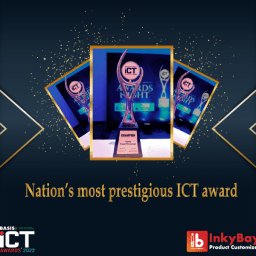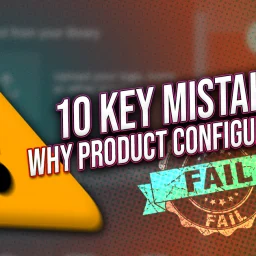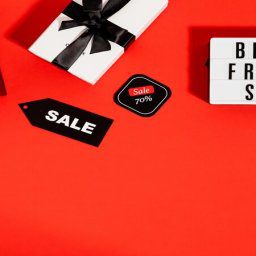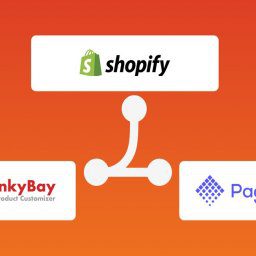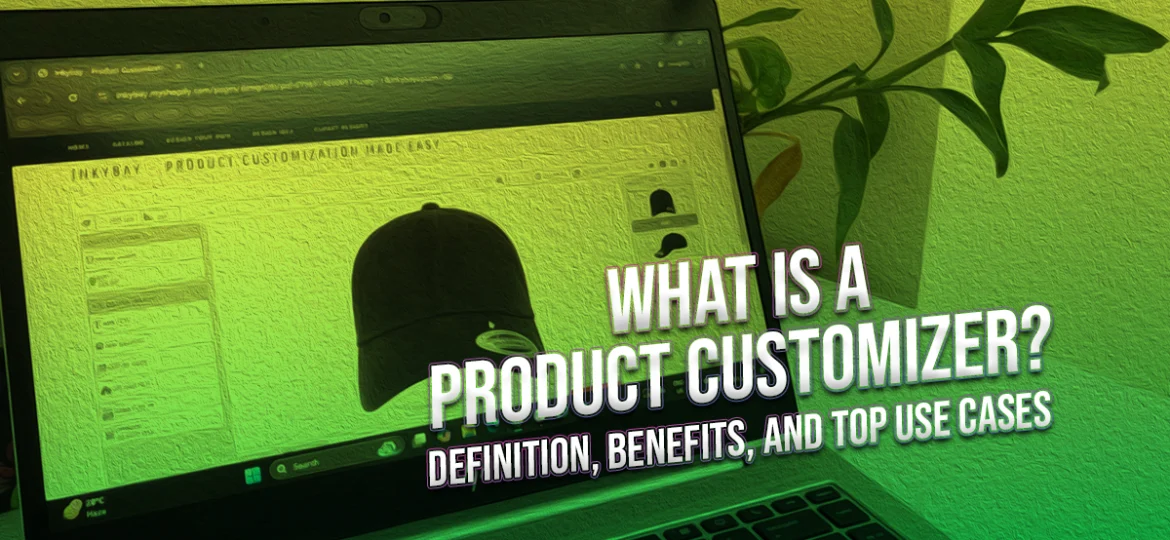
Last Updated on August 13, 2025
In ecommerce customers now not only seek out just a quality product but they also look for a product that creates a sense of uniqueness and authoritativeness. Product customization is a tool that offers the freedom to a customer to design, develop, and craft a product tailored to their taste and desire. The revolution in ecommerce is that all these can be done within the online store with a few taps or clicks.
In this article we’ll explore everything related to product customization and how offering customized products is shaping the ecommerce space for businesses.
Table of Contents
What is a Product Customizer?
Product customizer is a tool or software that allows a customer to personalize a product at the ecommerce store. This product customization can be done through choosing colors, adding texts, images, icons or symbols, and uploading a custom design. A customer may also choose the size of the product as well before they see the final personalized product in real-time.
For example, an ecommerce store selling personalized wall clocks can allow customers to add texts with different fonts, pick a dial type, choose colors, add a customized design, and also choose the size of the clock. This gives customers the sense of ownership and creativity in the purchasing process, making the product specifically unique to theirs.
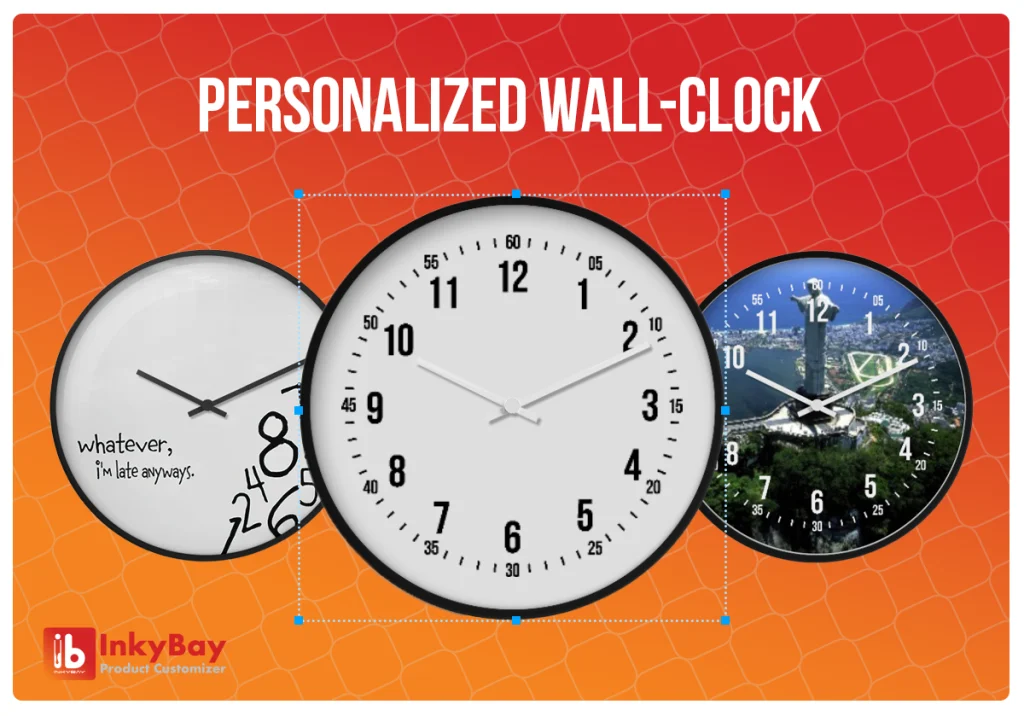
Types of Product Customizers
Product customizers are designed to cater to the unique needs of each business, as every business requires specific features for customization. For example, a product customizer for apparel will have different features compared to one for jewelry or furniture. To meet the distinct requirements of each business, the product customizer must be tailored accordingly. Therefore, selecting the right type of product customizer is crucial for ecommerce success.
Let’s explore some of the popular types of product customizers.
1. Apparel Product Customer
The product customer for apparel is one of the popular ones as the brands offer customers to personalize their T-shirt, hoodies, hats, and mufflers/scarfs. The customers of apparel brands can customize their product with colors, texts, images, and designs. Additionally, they may need the option of choosing the fabric type and sizes in most cases.
Customization Tools Needed:
- Color Selection
- Text and Font customization
- Image and design placement option
- Style and Pattern Selection
- Fabric and Size Selection
Popular Brands With Customization Feature
Nike By You is Nike’s initiative to attract customers who want to personalize their Nike products. They offer customization on a wide range of products available globally.
Another reputed brand is Custom Ink, an American online retail company specializing in custom clothing and other items like T-shirts, sweatshirts, bags, and tech accessories. Custom Ink provides a comprehensive product customizer with extensive configuration options.
2. Accessory Customizers
Accessories customization is another popular trend in product personalization. This includes items such as bags, hats, jewelry, and phone cases. Customers can customize these accessories to match their taste and style. However, this type of customization is particularly popular for gift purposes.
Customization Tools Needed:
- Engraving and monogram options for jewellery
- Pattern, color, and material selectors for bags and cases
- Visual previews to show customization choices
Popular Accessories Brands With Customization Feature
Casetify offers a phone case customizer allowing users to add initials, choose case materials, and select designs that match their tastes. Similarly, Custom Lids enables customers to personalize hats and caps according to their preferences.
3. Home Decor Customizers
Home décor items, including furniture, wall art, and other decorative products, can be customized using a product customizer that offers real-time views of the product, even through augmented reality (AR). Features such as dimensions, materials, colors, and patterns are provided to attract potential customers who seek unique and personalized product experiences.
Customization Tools Needed:
- Material and finish options (e.g., wood, metal, fabric)
- Custom measurements for items like sofas, tables, and curtains
- Pattern and color selectors for items like rugs and wallpaper
Popular Home Decor Brands With Customization Feature
Casetify offers a phone case customizer allowing users to add initials, choose case materials, and select designs that match their tastes.
4. Print-on-Demand Customizers
Print-on-demand (POD) products can be customized to meet individual preferences, making them ideal for personalized gifts. Items like mugs, tote bags, and posters are popular choices for customization, allowing customers to add personal touches such as names, images, or special messages. This level of personalization creates a unique and meaningful shopping experience, enhancing customer satisfaction and loyalty. For businesses, offering POD customization differentiates them in the market, potentially leading to higher sales and stronger customer connections. Overall, POD customization is an effective way to engage customers and boost business success.
Customization Tools Needed:
- Image and logo upload with placement options
- Text customization with a variety of fonts
- Multiple print styles (e.g., black and white, full color)
Popular Brands With Customization Feature
Zazzle and Printful allow customers to design various products, from coffee mugs to notebooks, offering creative freedom and personalized gifts. Users can upload images, add custom text, and choose designs, making each item unique and special. This customization enhances the shopping experience, making gifts more meaningful and personal.
5. Tech Accessory Customizers
Tech accessory customizers for items like phone cases, laptop skins, and tablet covers are becoming popular as consumers seek personalization. These customizations reflect individuality and personal style, enhancing the uniqueness of devices and driving demand. Personalizing tech accessories makes them stand out and provides a meaningful form of self-expression.
Customization Tools Needed:
- Options for device-specific designs (e.g., for various phone models)
- Customizable text, colors, and graphics
- Ability to preview customizations on a 3D model of the device
Popular Brands With Customization Feature
Skinit allows customers to create custom laptop skins and phone cases by uploading images and designing unique visuals. This personalization allows devices to stand out from its default look, reflecting individual style and creativity. Skinit’s customizer is popular for creating both personal and gift items, combining aesthetics with functionality.
How Product Customization Works
To customize a product, as you now already know, a customer first enters the ecommerce store’s space and chooses a product to customize. Next, the customize button can be found in the product page. The product customizer interface showcases all available options. Customers can choose colors, add text, upload images, and adjust the size and material.
While the customers are making these changes, it is appearing in a real-time live preview. This ensures that customers are satisfied with the final product before purchasing.
After completing the customization, customers move on to checkout. The details are saved, and the customized product’s final version is sent to the store owners.
Ecommerce customers now look for beyond just a transactional experience like choosing and buying. They, now, want a product that will reflect their personality and values they possess. Product personalization is probably the closest of all that allows a customer to meet these desires by offering unique, engaging shopping experiences. Product customization creates a deeper bond between the customer and the brand or the store they buy from. Product customization is a feature that creates one to stand different from others in a crowded ecommerce market.
Key Features of Product Customizers
1. Interactive Personalization
Customizable Colors:
Consumers can pick from a wide range of colors to fit their brand identity or personal preferences. Products like clothing, accessories, and home décor must have this feature.
Text Customization: Adding personalized text, such as names, messages, or quotes, makes the product unique and special. This is popular for items like mugs, T-shirts, and bags.
Image Uploads: Allowing customers to upload their own images or artwork adds a deeply personal touch. This is ideal for photo gifts, phone cases, and posters.
Design Tools: Many customizers offer tools like drag-and-drop interfaces, resizing, and layering options to make the design process user-friendly and flexible.
Enables customers to customize colors, text, images, and more, allowing them to create a product unique to their style.
2. Real-Time Preview
Shows customers a live preview of their customized product, reducing uncertainty and enhancing confidence in their purchase.
3. Pricing Flexibility
Allows dynamic pricing based on customization choices (e.g., premium materials or additional features), giving customers transparency and options.
4. Multi-Device Compatibility
Optimized for desktops, tablets, and mobile devices, ensuring a seamless experience across platforms.
5. Save & Share Functionality
Allows users to save and share their custom designs with friends or social networks, which can increase visibility and engagement.
Benefits of Using a Product Customizer in eCommerce
1. Enhanced Customer Engagement
Product customization allows customers to interact more personally with their chosen product, creating a tangible connection. This also builds the sense of ownership and builds a strong emotional connection to the product, which keeps the customer engaged. When they are engaged about the product, it is more likely they’ll be talking about it which could transpire as word of mouth marketing. They also may share it with their friends and peers in social media, increasing the chance of getting more traffic and potential sales from there.
2. Increased Sales and Higher Conversion Rates
A personalized product is given more attention than any product compared in the same alignment. Suppose you are offered with a Ferrari car of two versions, one the regular one and the other is of the same model but a customized Ferrari. It is more likely you’ll choose the personalized one to stay different than others within the same space. According to Boston Consulting Group 72% people prefer customized products while they choose brands.
A report by WiserNotify revealed that 89% of companies saw a significant increase in ROI when they offered personalization. These statistics emphasize the importance and impact of product customization.
3. Better Customer Retention
By offering customers a unique product experience, you increase the chances of repeat purchases. When customers enjoy a tailored experience that meets their unique needs, they’re more likely to return to the same brand for future purchases, knowing they can create something just for them.
4. Higher Profit Margins
Customized products often come with a premium price tag, as customers are willing to pay more for unique items that reflect their style. This added value translates into higher profit margins and allows businesses to generate more revenue without significantly increasing overhead.
5. Competitive Advantage
In today’s saturated market, offering product customization can be a critical differentiator. While many stores sell similar products, those with customization options can capture the attention of customers looking for something special. This competitive edge can be especially valuable in niches like fashion, accessories, or gifts, where personalization is highly valued.
Product Customizer for Shopify
Product customization is now a settled trend in eCommerce, with platforms like Shopify offering a range of solutions for seamless integration of product customizers into online stores. Whether using Shopify, WooCommerce, Magento, or BigCommerce, brands can access a number of available product customizers to meet their unique needs. This capability enables store owners to deliver a flawless shopping experience, effectively attracting and retaining customers.
1. Popular Customizer Apps for Shopify:
There are a number of product customizer apps available in the Shopify App Store, but what sets them apart for brands and Shopify stores are the functionality and features they offer. Not all the apps provide good value for money or effectively meet the needs of store owners. Let’s find the top product customizer app available on Shopify.
1. a. InkyBay Product Customizer
InkyBay stands out as a leading Shopify product personalization app. It offers a wide range of functionalities for merchants while ensuring a seamless user experience for customers with real-time customization views. The InkyBay app’s features reduce the loads on merchants and cut short the need for additional third-party apps. Moreover, InkyBay is regarded by merchants as a sole capable solution for product personalization on Shopify.
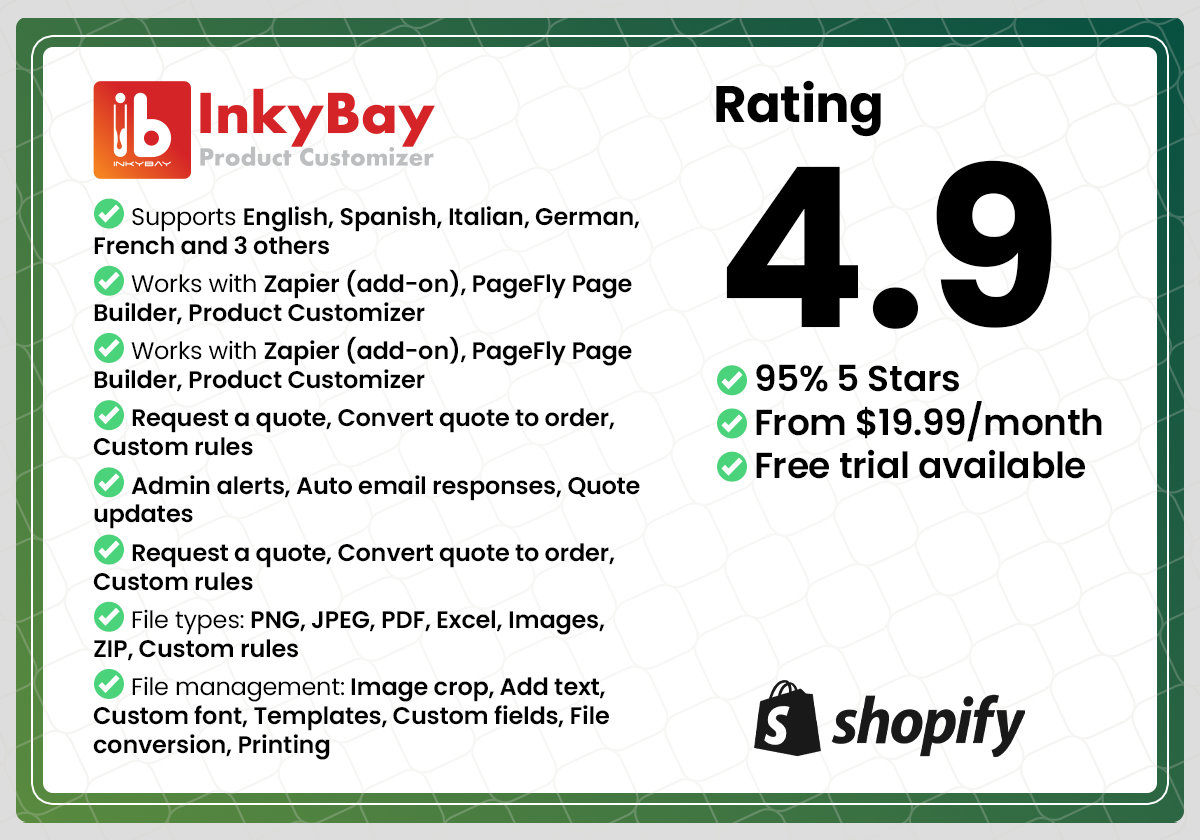 1. B. KickFlip Product Personalizer:
1. B. KickFlip Product Personalizer:
KickFlip is another product personalization Shopify app with comprehensive features. With KickFlip, customers can add text, images, colors, and other design elements to create unique products. The app also features a user-friendly interface, real-time previews, and dynamic pricing, making it easy for both merchants and customers to design personalized products.
1. c. Zepto Product Personalizer:
Zepto is a top product personalization app with a 4.7 rating from Shopify merchants. It lets you see your design in real-time and works with PageFly Page Builder. It also comes with a Conditional Logic feature, which shows or hides product options based on what the user selects.
How to Choose the Best Product Customizer for Your Store
When you’re confident that a product customizer app can meet customer needs and increase sales, it becomes significant to find the right one for your store. Out of all the available options and features, finding the perfect customizer tailored to your specific requirements is essential. Let’s explore how to find the best product customizer for your store.
1. Define your customization need
Your customization needs will depend on the products you offer. For example, if you have a furniture business, offering a tool to add text or images won’t be useful; instead, you’ll need options for color and material selection.
Next, assess the depth of customization your products require. Determine whether you need all the customization features offered by the product customizer or just a few selective ones. This will help you choose the right customizer for your needs. With the InkyBay Product Personalization app, you have full control over all the available tools within the app, ensuring that you can tailor the customization options to fit your specific requirements.
2. Check compatibility with your ecommerce platform
To have comprehensive options and tools for personalizing products can be attractive, but it’s important to make sure they are compatible with your eCommerce platform. Not all apps are available with all platforms.
However, the process is made easier if you’re working with a platform like Shopify because there are plenty of compatible apps. So, it really matters to find a platform-specific product customizer in order to save time and avoid confusion and indecision.
Another thing to consider is the integration of the app. While many apps run smoothly in the backend, some may require advanced setup procedures requiring custom code and other technical resources. When choosing such apps, it’s important to consider whether you have the technical expertise to set them up.
3. Prioritizing User Friendly design and experience
An effective customizer should be easy to use, with clear controls, a sleek design, and a lag-free, seamless experience. Choose a customizer which offers real-time previews so that customers can see their designs in real time, developing confidence in buying and lowering returns.
However, check that the customizer offers a consistent experience across all devices, especially with the rise in mobile shopping.
4. Consider Pricing Flexibility and Options
When you choose a customizer, prioritize those that offer flexible pricing based on design choices, such as premium materials, logos, or multiple colors. This dynamic pricing allows you to charge differently for different levels of customization, ensuring you can cater to diverse customer preferences while maintaining your profitability.
Additionally, it is also important to consider the total cost of the customizer. This includes setup, maintenance, and transaction fees. Balance these costs against the revenue you expect from customized products. InkyBay, in this regard, offers a simple pricing model with no hidden charges or extra commissions. Merchants pay a one-time monthly or annual fee to access all features, avoiding additional costs at every step.
This approach will help you determine whether the customizer provides a valuable return on investment, ensuring that your business remains financially sustainable while offering personalized products.
5. Evaluate Performance and Loading Speed
A product customizer should not slow down your site, as this can negatively affect both customer experience and SEO rankings. Therefore, it’s important to choose a customizer known for its speed and efficiency.
As your store grows, the customizer should be capable of handling increased traffic and orders without performance issues. Go for customizers with a reputation for stability, particularly if you expect high traffic volumes during sales or seasonal promotions. This ensures your site remains functional and responsive, maintaining a positive user experience even during peak times.
6. Review Customization Flexibility and Design Options
A range of options, such as text, colors, photos, and patterns, should be offered by the customizer. Additional options like svg design uploads, design layering, and even 3D modeling may be available in improved customizers.
Some customizers enable customers with modifiable ready-made templates and design preset for businesses looking to streamline customisation. This feature is especially helpful for people who do not know how to design.
7. Analyze Analytics and Reporting Tools
Some customizers include built-in analytics that provide insights into popular customization options, average order value, and customer preferences. This valuable data can inform future product offerings and shape marketing strategies effectively.
Additionally, certain customizers offer inventory tracking for customized products. This feature helps ensure the smooth management of materials and components, allowing businesses to maintain efficient operations and meet customer demands seamlessly.
8. Consider Customer Support and Reliability
Different customizers offer different levels of support. Particularly if you are new to eCommerce or customizer integration, it is important to choose a product personalizer app that provides immediate and reliable support.
Besides, a detailed setup guide, tutorials, and FAQs are extremely useful resources for troubleshooting and ensuring a seamless experience for your customers. These resources can make the integration process smoother and help you get the most out of your product customizer.
Examples of Brands Using Product Customizers Successfully
Many popular and reputed brands have adopted product customization to improve customer engagement and increase sales. These brands showcase how integrating customizers can transform the shopping experience, drive conversions, and build strong brand loyalty.
1. Nike – Nike By You
Many Nike products, including exclusive Finish Line Nike releases, can be customized through the Nike By You platform.”Customers can choose the colors, materials, and even add text or initials to customize their Nike By You sneakers.
Why “Nike By You” is Successful:
- Empowers Personal Ownership: Allows customers to take ownership of their sneakers by customizing them to their liking.
- Brand Leverage: Utilizes Nike’s strong brand reputation to enhance the attraction of personalized products.
- Real-Time Previews: Provides real-time previews so customers can see their designs before making a purchase.
Results: Nike has experienced higher customer engagement and retention as customers create unique products that showcase their personal style and preferences.
2. Miami Sublimation
The customers can choose colors, add texts and clipart, upload images and get a real-time view of the customization.
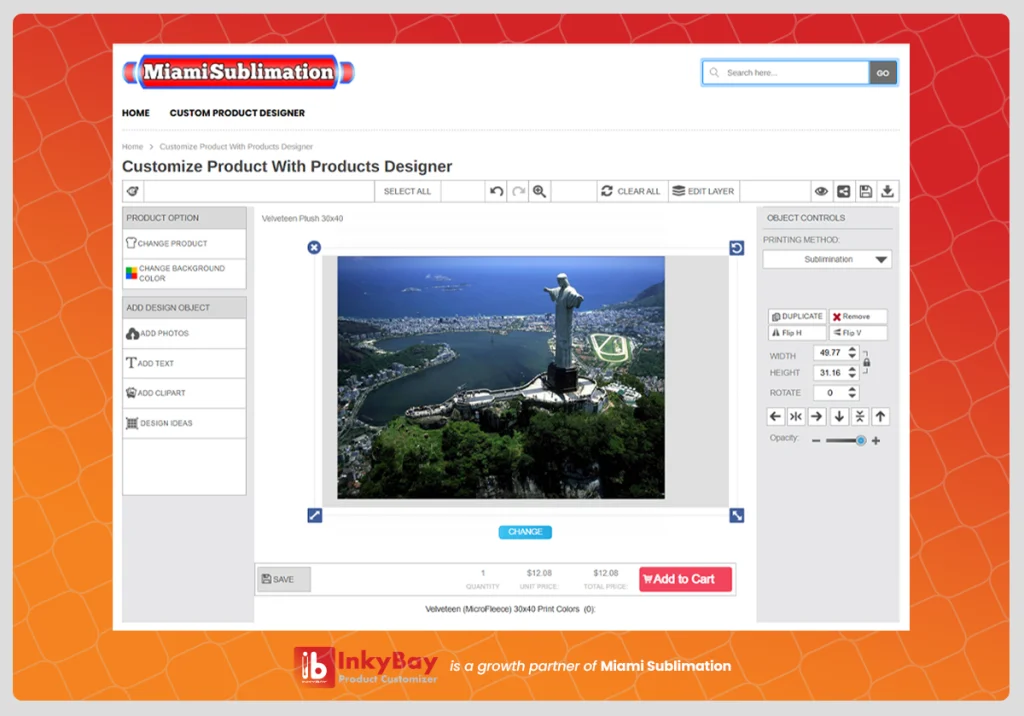 Why “Miami Sublimation” is Successful:
Why “Miami Sublimation” is Successful:
- Empowers Personal Ownership: Miami Sublimation empowers customers to design their products, such as apparel and home decor items, with personal touches like custom images, text, or patterns. This personalization approach fosters a deeper emotional connection between the customer and the product, making items feel special and meaningful, which leads to higher satisfaction and reduces the likelihood of returns.
For example, a customer designing a blanket with a family photo or a T-shirt with a personal message creates an emotional bond, making the purchase more memorable and increasing the chances of repeat business.
- Brand Leverage: Miami Sublimation has established itself as a trusted brand in the custom printing industry, known for its high-quality sublimation printing that assures customers of professional and durable personalized items. The company expertly combines its printing expertise with personalization options to create unique products that reflect individual customer identities while upholding brand quality.
By offering exceptional personalized products, Miami Sublimation develops long-term customer relationships, with clients returning for special occasions and business needs, such as branded merchandise for events or giveaways
- Real-Time Previews: Miami Sublimation’s real-time preview feature significantly enhances the interactive design experience by allowing customers to see their designs instantly, which eliminates guesswork and boosts purchase confidence.
This feature also reduces errors and dissatisfaction by enabling adjustments before finalizing designs, leading to fewer returns and exchanges. For example, a customer customizing a backdrop can modify text placement, image size, or color choices in real time, ensuring the final product matches their expectation.
Challenges and Considerations When Implementing a Product Customizer
Implementing a product customizer into your eCommerce store can bring a number of advantages, but it also presents unique challenges and considerations. Successfully dealing with these challenges ensures a smooth customer experience while optimizing your return on investment.
a. Technical Integration
Depending on your choice, product customizers might require complex integrations with your eCommerce platform, inventory management system, and payment gateways. Ineffective implementation can lead to glitches or an unsatisfactory user experience.
The merchants with InkyBay Product Personalizer don’t have to worry about this technical stuff as the app has one touch integration.
b. User Experience (UX) Design
A complex or poorly designed customizer can frustrate customers and result in abandoned purchases.
A product designer or personalizer like InkyBay is a godsend for merchants aiming to offer a dynamic and highly appealing user experience. The frontend tools are as meticulously designed as the backend management functionalities, ensuring seamless integration and optimal performance.
c. Performance and Speed
Integrating a personalizer app can lead to longer load times, which may discourage customers and adversely affect SEO rankings. When a website loads slowly, users may become frustrated and abandon their purchase, resulting in higher bounce rates and lost sales.
Additionally, search engines prioritize faster-loading websites, so increased load times can negatively impact your site’s visibility in search results.
To resolve these issues, it’s very important to choose a product personalizer optimized for performance and to implement strategies such as image compression, caching, and efficient coding practices to ensure your site remains fast and responsive. Again, InkyBay is a go-to solution in this regard as well. At least explore InkyBay for free to verify the claim.
Scope of Customization
Offering too few options can leave customers feeling disappointed, as they might not find the customization they desire. On the other hand, offering too many choices can overwhelm them, leading to decision fatigue and potentially causing them to abandon the purchase altogether. Finding the right balance is important in this case.
It’s important to offer customization options that meet different customer preferences without confusing them. Group similar choices together and provide clear, easy-to-follow paths to make the process enjoyable. Using user-friendly design tools helps customers feel confident and in control. This simple approach improves their experience, makes them happier, and increases sales and loyalty.
Future Trends in Product Customization and Customizers
As technology advances and customer expectations change, product customization in future awaits for exciting developments. Businesses that adopt these new trends will gain an edge in competitive markets and provide creative solutions to meet the increasing demand for personalized shopping experiences.
1. Advanced Personalized Marketing
Using advanced data analytics, businesses can offer hyper-personalized marketing campaigns based on customers’ customization habits. For example, If a customer often designs minimalist-style products, they’ll receive targeted promotions and design suggestions that match their tastes, enhancing their overall shopping experience.
2. Global Reach with Local Touch
As product customizers are now offering service around the world, apps in future should focus on localization. This means they will support various languages, currencies, and cultural design preferences. This approach ensures more customers can have smooth and personalized shopping experiences.
3. AI-Driven Customization
Artificial intelligence (AI) is probably the most impactful future trend that businesses are likely to experience. AI, even in its limited form, is already changing how product customization works.
In the future, AI will study what customers like, what they have bought before, and how they behave to give personalized recommendations.
This makes the design process easier and ensures customers get suggestions that match their style and needs. For example, AI can suggest designs, colors, or materials based on a customer’s age, interests, or past purchases.
4. Immersive Shopping Experiences with AR and VR
Combining AR (Augmented Reality) and VR (Virtual Reality) with product customizers is changing the way customers see their designs. AR lets shoppers view their customized items in real life, like trying on virtual clothes or placing custom furniture in their homes. VR goes even further, allowing customers to interact with their products in a 3D world before buying. These technologies boost customer confidence and reduce returns.
5. Eco-Friendly and Sustainable Solutions
As people become more environmentally aware, future product customizers will emphasize sustainability. The platforms will offer eco-friendly materials, reusable options, and clear supply chains. Customers might also get features that show the carbon footprint of products or help them choose greener options, supporting global sustainability efforts.
Conclusion
Product customizers have transformed business engagement by offering personalized shopping experiences that meet modern consumer demands. They boost customer satisfaction, loyalty, and give businesses a competitive edge, while also increasing conversion rates and profit margins. Implementing customizers, though challenging, can be addressed with the right planning and tools. The integration of AI, AR/VR, and sustainable practices will further elevate customization, enhancing innovation and customer satisfaction.
Successful brands demonstrate how product customizers boost sales and create memorable experiences. Investing in a robust customizer can help businesses grow and strengthen their customer relationships.


